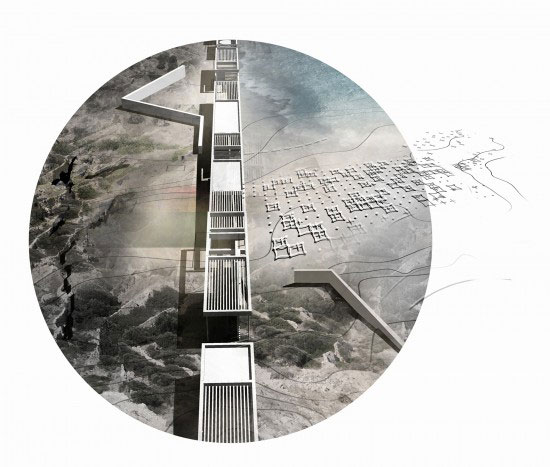An experimental coastal landscape project involving Kent Law School academic Dr Thanos Zartaloudis has generated an innovative design for outdoor self-sustainable beach accommodation in Greece that operates without profit, management or claims to ownership.
The design includes an alternative legislative framework that opposes privatisation of the coast and facilitates free, communal use.
Dr Zartaloudis has worked alongside a group of architects, a civil engineer, a media artist and technical design support company, Prelab, to devise the project entitled Mechanism of Suspension.
The original brief for the project required the design of a tourist accommodation unit in an idyllic, non-existent coastal landscape under the general title: Tourism Landscapes – Remaking Greece.
The project was commissioned by Greek Architect Yannis Aesopos for inclusion in the 14th International Architecture Exhibitioncurated by the internationally renowned architect, Rem Koolhaas.
Dr Zartaloudis said: ‘In this project we asked: How can we expose the limits – economic, legal and social – of the ruthless exploitation and privatisation of natural resources and commons that the current economy, legal provision and way of life enforce? We proposed, through an experimental interaction of law, design and architecture, an affirmative architectural practice along with an alternative legislative framework in support of the free access to and use of the commons.’
Instead of designing a hotel or any typical, coastal tourist accommodation, the project team wanted to imagine how a beach might be occupied in a different way. This was conditioned on inventing a new form of legislation that would support common living.
Dr Zartaloudis said: ‘Devising a new law to support an alternative understanding of the use of natural resources assumes necessarily an alternative way of living and an understanding of using what is common and necessary anew, in distinction to the overarching framework of private and public property rights.’
‘The purpose of any act of socially and environmentally minded design today should be an inquiry into positive strategies for common use.’
Mechanism of Suspension was launched in March 2014 and is currently being exhibited at the International Architecture Exhibitionin Venice until the end of November 2014. The project has generated a positive response with media coverage in leading newspapers and architecture magazines in Italy and Greece.
Dr Zartaloudis joined Kent Law School in July 2014. Himself an alumnus of the School, he has studied law and philosophy at the University of Amsterdam and the University of London. He has taught in many universities internationally and held a post at the University of London, Birkbeck College for over ten years. He will also be teaching at the Architectural Association in London later this year.
The focus of Dr Zartaloudis’s architectural research lies in architectural theory and urban design, particularly in the way in which these subjects overlap with history, theory and legal regulation.
Dr Zartaloudis’s latest book is entitled Giorgio Agamben: Power Law and the Uses of Criticism. He is also the editor of a new book series titled Encounters in Law and Philosophy, to be launched in 2014/5.
More news of Dr Zartaloudis’s research can be found on Twitter and on the Mechanism of Suspension’s Facebook page.

